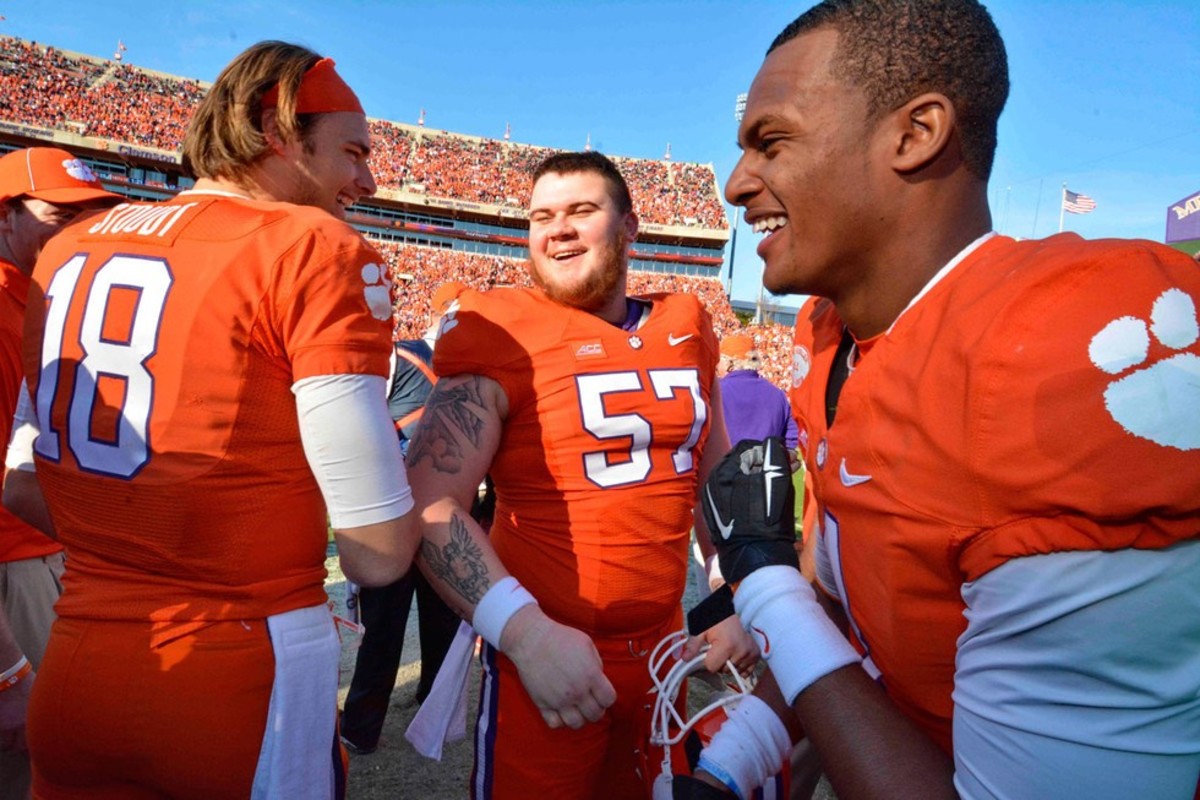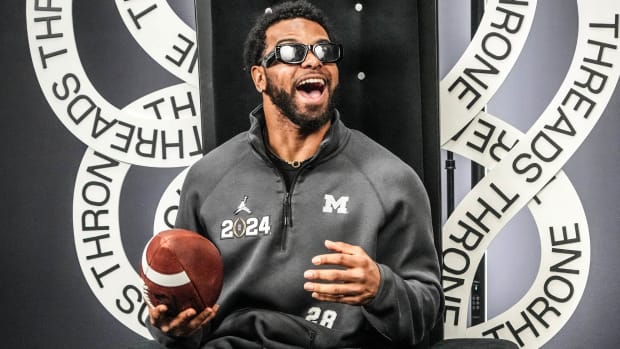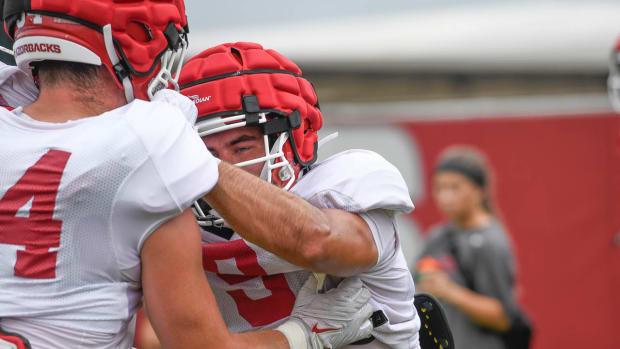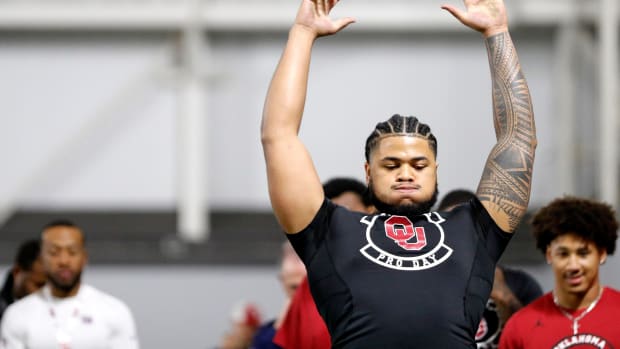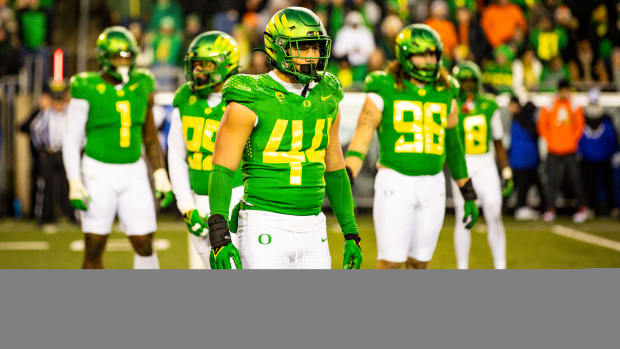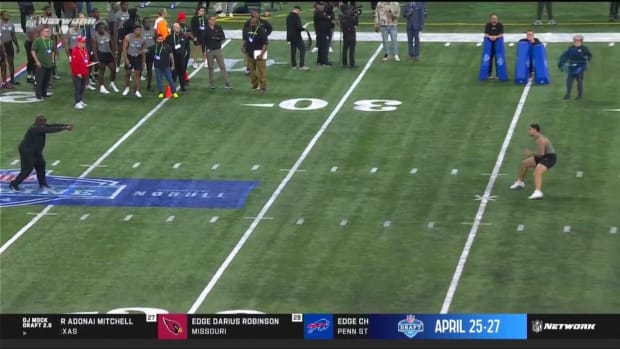Out of the darkness: How Clemson's Jay Guillermo overcame depression to become the Tigers' leader
CLEMSON, S.C. — The town of Lawndale, N.C., is a speck on the southern border of the state, a rural section of Cleveland County with a population of about 600. Ron Greene, 64, has lived there for 28 years, the past nine as a retired high school football coach. Last spring Greene's 20-year-old grandson stopped by his house with an unorthodox question. "He came in one day and said, "Papa, have you got an ax?'" Greene recalls. "I said, 'An ax? Well, yeah.'"
For a moment, Greene hesitated. Jay Guillermo was in a bad place, and had been for a while, so Greene was reluctant to put an ax in his hands. But this was the kid who had briefly lived with Greene following his parents' divorce when he was three years old—with whom he had forged a relationship that resembled a father-son bond. Greene trusted Guillermo, so he retrieved his ax, one affixed with an aged, wooden handle.
That afternoon Greene watched Guillermo work, chopping down a pine tree that lined the edge of the property. In the days to come, Guillermo became increasingly methodical: He cut trees into 10-foot logs, each about a foot wide, and used pieces of wood as makeshift barbells. He squatted tree trunks and lunged across the yard with lumber balancing atop his shoulders. "He was doing basically any lift that he could," Greene says, "just to do something different."
At the time, Guillermo desperately needed different. He needed a way to escape the darkness, the sense of hopelessness that had taken hold of his life and refused to let go. Depression had lured Guillermo to his grandfather's backyard, a two-hour drive north of Clemson University on Interstate 85. Last spring Guillermo should have been practicing as an offensive lineman for the Tigers; instead, he devoted himself to chopping wood, unsure if he would ever play football again.
But with each swing of the ax, with each day spent away from campus, Guillermo came slightly closer to finding what he had lost.
*****
Phelan M. Ebenhack/AP
Depression doesn't typically take effect immediately, like a case of food poisoning or a sprained ankle. It often sets in more gradually, a lingering sense of unease that chips away day after day, hour after hour. Guillermo struggles to pinpoint the moment when he descended into depression, but he harkens back to Oct. 4, 2014, when Clemson beat NC State 41–0 at Memorial Stadium. Guillermo broke his right foot in the second quarter, halting what had been a promising fall for the redshirt sophomore. To that point Guillermo had rotated with center Ryan Norton along the offensive line. An injury threatened to minimize his role.
The setback was the last thing Guillermo needed. He grew up cheering for Clemson, and committed to the school in February 2011 as the top-ranked center recruit in the country, according to ESPN. By his third season in college, however, he had yet to justify that hype. An injury delivered a fresh blow to his psyche, and Guillermo wondered if he would ever live up to expectations.
He was forced to sit out the next five games, and during that time doubt permeated his thoughts. He had played football since the second grade; in fact, he grew up as gridiron royalty in North Carolina. Greene won 174 games, including the 1994 state title, over 24 seasons as the head coach at Burns High in Lawndale, and the school named its stadium after him in 2009. Guillermo was supposed to star in the trenches, but as he languished on the sideline, he felt his love for the game slip away. "I kind of defined myself as a football player," he says. "When I couldn't play football anymore, I thought, I'm not worth a whole lot right now."
Guillermo returned to the field for Clemson's final three games of the 2014 season, playing 44 snaps against Oklahoma in the Russell Athletic Bowl on Dec. 29. But he had already tumbled into a debilitating cycle, and his troubling tendencies soon became routine. He skipped workouts and stopped taking care of his body. He went drinking three or four times a week. After entering the year at 315 pounds, he ballooned to 365 by January. He even contemplated suicide.
When teammates asked how he was doing, Guillermo faked a smile to hide his discomfort. He withdrew from everyone, barely considering himself part of the program. "He stopped hanging out with guys on the team," says Thomas Austin, a former Clemson center from 2006–09 who now works as a graduate assistant with the Tigers' offensive line. "He just isolated himself from everybody."
After the bowl game, Clemson gave its players a break, and Guillermo went home to Lawndale. For the first time in his life, he didn't miss the sport. During the opening week of spring classes the Tigers gathered for a meeting at their facility. Afterward, Guillermo called his mother, Christie Clary, in Hickory, N.C., where she serves as a volunteer coordinator at Safe Harbor Rescue Mission. He uttered nine words that once would have seemed unfathomable: I don't think I want to play football anymore.
*****
Joel Auerbach/Getty Images
According to the National Institute of Mental Health, "major depression is one of the most common mental disorders in the United States," and an estimated 15.7 million adults aged 18 or older experienced at least one "major depressive episode" during the 2014 calendar year. That number represented 6.7% of adult Americans and was even higher (8.9%) for college-aged individuals (18–25) over a 12-month span.
Student-athletes can find themselves at a higher risk for mental health disorders. In a 2015 article published by the British Journal of Sports Medicine, researchers at Drexel University and Kean University surveyed 465 Division I athletes over a three-year period and determined nearly a quarter (23.7%) exhibited "clinically relevant levels of depressive symptoms." The Atlantic reported student-athletes who participate in contact sports are more likely to abuse alcohol than those who don't, and Dr. Chris Bader, a counseling and sports psychologist at the University of Colorado, said student-athletes often feel less comfortable seeking help than other students.
"For a non-student-athlete, you might see the same incidents of depression, but that person can take a break, take a mental health day, go see someone in the counseling center without much ado," Bader says. "For a student-athlete, it's tougher. There's still a stigma of mental health around student-athletes, especially on males and depression. … You have separate presentations of depression with male athletes. You see withdrawal, you see anger outburst, you see drinking, you see drug use."
For Guillermo, depression manifested itself through defense mechanisms; he didn't want teammates to learn of his pain, so he mastered masking it. He honed a reputation as a jokester who never succumbed to a bad day. "If there's one guy on the team you'd be like, that guy's never going to be sad, it's me," Guillermo says.
BALLARD: Christian McCaffrey can't be summed up by his accomplishments
Every Friday night during the 2014 season Clemson took a team trip to the movies, and bus rides to the theater served as Guillermo's time to shine. He would grab the intercom and deliver impersonations of the Tigers staff. (His impression of head coach Dabo Swinney is a fan favorite, but Guillermo prefers his take on offensive line coach Robbie Caldwell's Southern drawl.) "In life after football, he may have a job as a comedian," co-offensive coordinator Jeff Scott says. "He reminds you of Larry the Cable Guy."
But Guillermo would later retreat to his on-campus apartment, shut the door and tear down the façade. A feeling of despair was constantly present; he just made sure no one saw it. "It's like having a backpack, and every few days somebody drops a weight in it," Guillermo says. "It becomes unbearable at a point in time."
Guillermo needed to get away, and he dreaded breaking the news to Swinney. He feared his coaches would deem him unfit for a sport defined by toughness, and he felt overcome by shame. One week after speaking with his mom in early January, though, a nervous Guillermo sat down with Swinney and shared the feelings he had kept inside for so long. Swinney had sensed something was amiss, but he never anticipated this. "I couldn't believe it," Swinney says. "I knew that he was a lost kid, because the Jay Guillermo that I know loves football. I've never recruited a guy more committed and more passionate about the game of football than Jay Guillermo. So I knew we had a real problem."
For the next month and a half, Guillermo met with a team psychologist and a local psychiatrist. But that only did so much. In late February he had another sit-down with Clemson's staff, and after getting input from his family he decided to leave school. Guillermo withdrew from classes in the final week of February and went to Lawndale. While the Tigers reserved his roster spot, they placed no timetable on a return. "If he never played football again, that was fine with me," Swinney says. "I just wanted him to be a healthy person."
Says Scott: "Everybody watches these guys in uniforms and pads. They're kind of superhuman sometimes. [This was] a good reminder to all of us—fans, spectators, coaches—there are young men inside of there."
*****
Tyler Smith/Getty Images
Life in Lawndale moved at a slower pace, and Guillermo settled into a routine. Each morning he woke up, ate breakfast and drove his 14-year-old brother, Justin, to school. Then he would work out, either in the weight room at Burns High or in his grandfather's backyard, taking a few swings with the ax. His wood-chopping time evolved into 30-minute spurts of meditation. "It was Rocky-esque," Guillermo says.
Guillermo also met with a general practitioner, an endocrinologist and a sleep specialist. Doctors found his thyroid, which produces hormones that impact processes like metabolism, to be severely underproductive; his testosterone, for example, was "way, way, way below the level it was supposed to be," Guillermo says. He was later diagnosed with sleep apnea—which can affect weight gain—and high blood pressure (190 over 100). In the wake of his injury, the lineman had let his body go, and doctors weren't surprised his emotions had followed suit. Guillermo began to take six medications to correct his imbalances.
Back at Clemson, the coaching staff kept tabs on Guillermo, but it made sure to give him space. Austin, a two-time All-ACC center who Guillermo idolized as a kid (he once set a photo of Austin, wearing a Tigers jersey, as the desktop background on his computer), emerged as a pillar of support. He called and texted Guillermo, and most interactions had nothing to do with football. "I think that helped by separating football from the personal side of it," Austin says. "Just feeling loved and knowing he was valued independently from his performance as a football player."
Meetings with a therapist proved cathartic for Guillermo, too. Three or four times a week, he expressed his concerns outside the confines of sports. "It was really relieving to me that I could talk to someone that didn't have any prior knowledge of who I was, or prior feelings about me in any way," Guillermo says.
As his time in Lawndale wore on, Guillermo picked up an old hobby, fishing, which he had loved in high school but had forgotten at Clemson. It offered him extended stretches of solitude and helped to clear his mind. Occasionally, however, he would scroll through video clips from practices and teammates' posts on Twitter. At the end of March, he summoned the strength to call Swinney with some news: He wanted to resume the life he had left behind, and the two mapped out a time for him to come back.
By May, Guillermo remembers feeling joy again, some light flittering through the darkness. Later that month he went to Clemson and met with Swinney. For the first time in a year, the coach saw a revitalized person. Not only had Guillermo's buoyant disposition returned; Swinney detected pride. Depression had snatched football from Guillermo, but he had emerged stronger. Now, he was ready to regain his role.
Guillermo got to campus in June 2015 for the second session of summer classes. Before his arrival, he worried about his teammates' reaction to his presence. Would they embrace a player who had disappeared? Could he physically keep pace after missing all of spring practice?
An anxious Guillermo quickly got an answer: He showed up for his first workout at Woodland Cemetery, a conditioning spot referred to in the program as "Cemetery Hill," and stunned teammates and coaches with his performance. He weighed 335 pounds, a 30-pound drop from his max weight the previous fall, and was suddenly beating several of Clemson's veterans in sprints. A strength coach pulled him aside and patted him on the back. You must have worked your tail off at home, he told him. "From that point on," Guillermo says, "I put the impression in their head that I was there to work."
That night Guillermo called his grandfather back in Lawndale. He spoke glowingly about his mindset, both on and off the field. Greene recalls beaming as he heard his grandson on the other line.
"I think I made the right decision," Guillermo said.
*****
Icon Sportswire via AP Images
On March 30, 2016, Guillermo stands in the northwest tunnel of Memorial Stadium, sweating in shoulder pads and cleats. It's a cool evening, moments after the Tigers have finished practice, and Guillermo can hardly contain his elation. "I'm about to jump out of my daggum shoes, it's going so well," he says.
A few minutes later sophomore defensive tackle Christian Wilkins waltzes by, giving his center a high-five. Guillermo points to his teammate as he walks past. "A guy like Christian Wilkins, he's not even an offensive player," Guillermo says, "but being in the locker room with them, guys like that are really lifting me up."
At this time last year, Guillermo had given up on football. More worrisome, he had lost a grip on his identity, and he struggled to come to terms with who he was. But Guillermo found peace before returning to campus, and then he thrived: He started 13 of 15 games in 2015 and earned ACC Offensive Lineman of the Week honors three times—a first for a Clemson player since 1989—as the Tigers capped an undefeated regular season with a conference title and a berth in the national championship. He also carved out time to go fishing, making occasional trips to Lake Hartwell near campus.
This was the Guillermo coaches and teammates knew: smiling and positive, a big talent with a bigger heart, a personality outsized enough to fill every seat in Death Valley. "There's a big difference in just the way he handles himself," senior tailback Wayne Gallman says. "He's way more free."
Last October Guillermo got a tattoo, the newest in his collection of 14, that features a shield embossed with the words "THE UNION: OFFENSIVE LINEMAN" next to a Clemson paw print. The symbolism is striking: Guillermo, unequivocally, has become proud of what he is doing. At the Tigers' team banquet last winter, departing guard Eric Mac Lain, the leader of the 2015 offensive line, motioned toward Guillermo and said, You're next. The coronation resonated, as Guillermo has embraced filling his role this off-season.
Those within the Tigers' locker room have reciprocated the love. Each spring Clemson's coaches distribute sheets of paper and implore players to write the names of the roster's top three leaders—the most "all-in" guys, as the team frames it—before sharing the results. Last year Guillermo wasn't on campus to partake in the exercise; this year he tied junior quarterback Deshaun Watson, the 2015 Heisman Trophy runner-up, in receiving the most votes.
"He's one of the most remarkable stories I've ever seen," Swinney marvels. "Sometimes you've got to fail, and I think that was the case for Jay. Some guys never recover. But, boy, not only did he get himself healthy again, he became one of the best leaders I've ever had here."
As Guillermo prepares for his senior season, he hopes his journey will inspire others. Last season he discovered he wasn't alone in his battle with depression; multiple opposing players pulled him aside after games and whispered, Thank you for telling your story. Once someone who disguised his true feelings, he now makes a point to lay bare his emotions. Around the Tigers' facilities, he is famous for ending every interaction the same way: I love you, man.
And that backpack, filled with stones? It's still there, Guillermo says. "There's just not as much weight in it."
